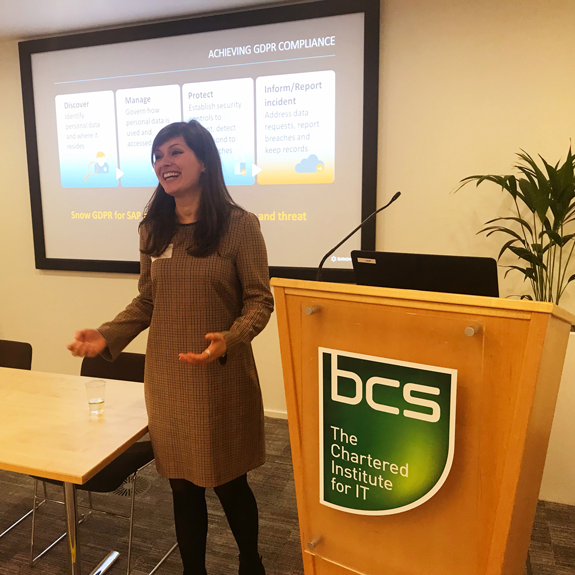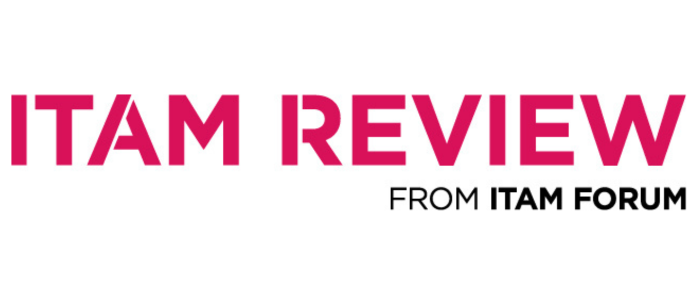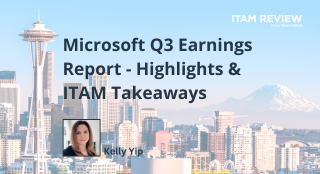SAP rumour mill: Diageo win appeal against indirect ruling, new audit tactic for user measurement

Telma Rafael, SAP SME, Snow Software “SAP is rumoured to be changing their audit approach on how to classify users”
I attended an interesting session at the BCS SAM networking group last night.
The main topic of conversation was SAP, led by Snow’s subject matter expert Telma Rafael.
Notable discussion points:
New Audit Threat on User Permissions
SAP is rumoured to be changing their audit approach on how to classify users: “It is believed customers will need to classify users based on their authorizations rather than usage, typically users have a lot more permissions than they need” said Telma.
So my understanding of this is that you might have demoted a user to save money, but because that user has potential access rights you’ll get clobbered accordingly. I guess this is similar to having Microsoft SQL Enterprise sat on a server doing nothing; you don’t pay for usage, you pay for it’s existence and potential to be used. We’ll look at digging into this in more detail over the coming months.
7 Year Battle for SAP’s future
SAP R/3 support is due to end in 2025 – so many organizations with perfectly stable SAP implementations are being persuaded to migrate to S/4 HANA when a) they don’t need or want to go to cloud and b) some argue S/4 HANA is not yet fit for purpose compared to the on-premise alternative. Why might a customer go through the considerable investment in rebuilding SAP when they could go with a cheaper, more nimble, less aggressive alternative? Telma claimed S/4 HANA adoption was around 25%, so clearly a big battle and crunch time for SAP’s future over the next seven years.
Diageo win appeal with Indirect Access Dispute
I also heard during the SAP discussions that Diageo’s appeal against SAP for indirect access has been upheld. Citing a lack of specialist knowledge by the Judge presiding over the SAP litigation. I’m yet to find any court papers to verify this rumour, if any readers find anything please share.
Dinosaur Audit Tactics: Desperate times, desperate measures
We also heard that SAP was known to initiate indirect access claims and audit threats when losing a RFP to Salesforce.com or other CRM platforms. If validated, clearly things are getting a little desperate for the ERP dinosaur.
ITAMs role with GDPR
The second half of the BCS networking event was dedicated to an open discussion on the role ITAM plays in supporting GDPR. For me, GDPR is a data protection or InfoSecurity responsibility. As with a cybersecurity outbreak, ITAM’s role is supportive. Security are our friends, our allies, our stakeholders, we want to support them by identifying GDPR risk.
Thanks to Kylie Fowler and Joseph Powell for an interesting event.
- Learn more about the BCS SAM Networking Group here.
- Learn more about the upcoming BCS conference on the 23rd May here.
Can’t find what you’re looking for?
More from ITAM News & Analysis
-
10 Strategic Lessons for Tackling Compliance, Audits, and Software Licensing Risk in 2025
The ITAM Forum’s 2025 global ITAM research report in partnership with Azul reveals some fascinating insights into the financial, operational, and compliance risks involved in software licensing and audits. This article provides a high-level overview of ... -
Broadcom vs Siemens AG - A Brewing Storm
The ongoing legal battle between VMware (under Broadcom ownership) and Siemens is yet another example of why ITAM goes far beyond license compliance and SAM. What might, at first glance, appear to be a licensing dispute, ... -
Shifting Left Together: Embedding ITAM into FinOps Culture
During one of the keynotes at the FinOps X conference in San Diego, JR Storment, Executive Director of the FinOps Foundation, interviewed a senior executive from Salesforce. They discussed the idea of combining the roles of ...
Podcast
ITAM training
Similar Posts
-
Microsoft Visual Studio Licensing Guide: Reduce Risks
(This article was reviewed and updated on 3 July 2025) Visual Studio Licensing Visual Studio subscriptions are licensed Per User with each licensed user able to. “install and use the software on any number of device”. ... -
Broadcom vs Siemens AG - A Brewing Storm
The ongoing legal battle between VMware (under Broadcom ownership) and Siemens is yet another example of why ITAM goes far beyond license compliance and SAM. What might, at first glance, appear to be a licensing dispute, ... -
Microsoft Power Apps: Current Pricing Models Comparison
Back in November 2021, Microsoft made Power Apps available under the pay-as-you-go (PAYG) model, alongside the traditional Per User/Per App options. This PAYG model has gained popularity. It ensures simple rightsizing for Power Apps environments. Here, ... -
Microsoft Q3 Soars as AI and Azure Growth Fuels Market Gains
On the 30th April, Microsoft released its Q3 quarterly earnings report, exceeding expectations and igniting investor optimism. Investors had been keeping a watchful eye on Azure’s Cloud performance after Microsoft’s Q2 Cloud results fell short of ...




